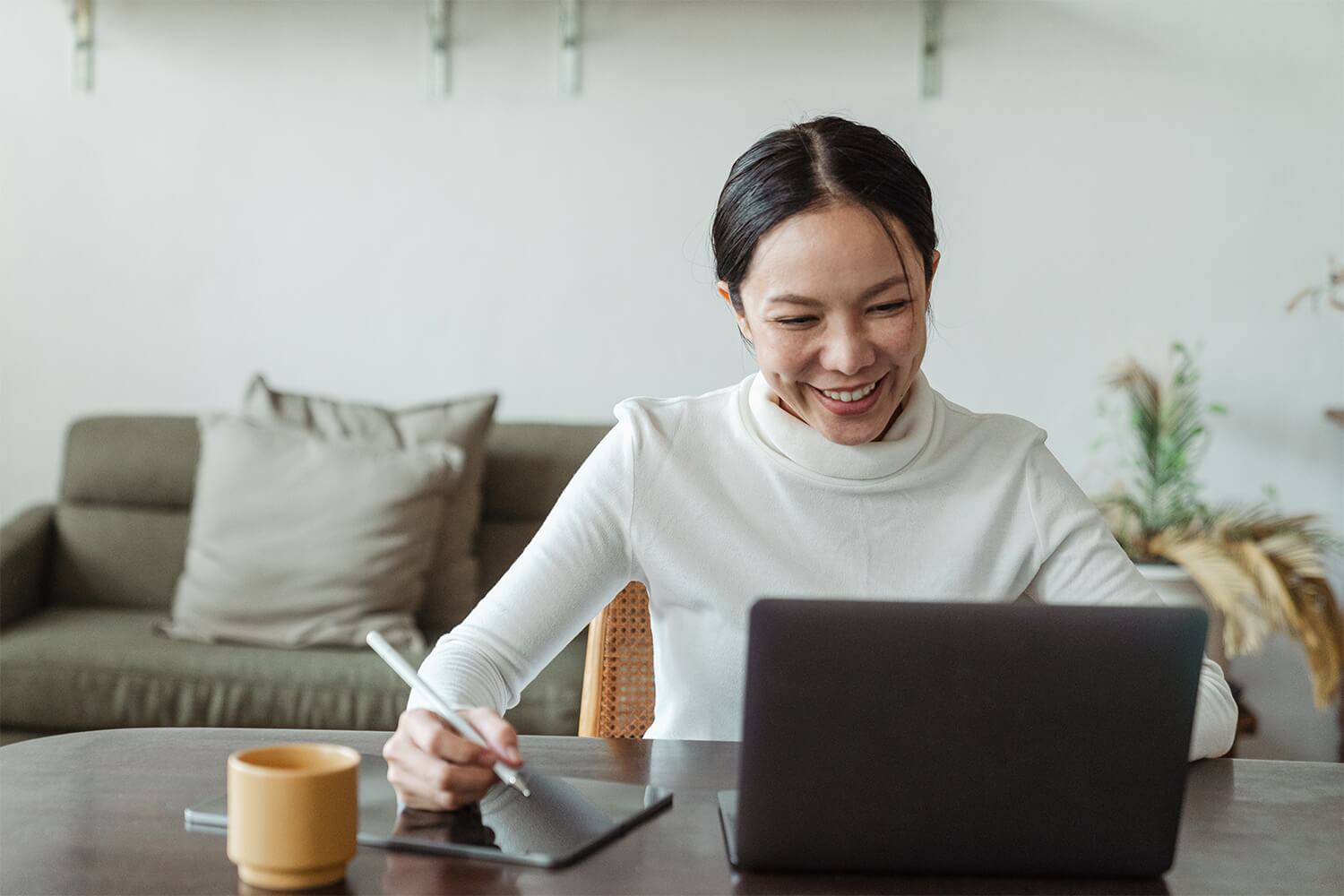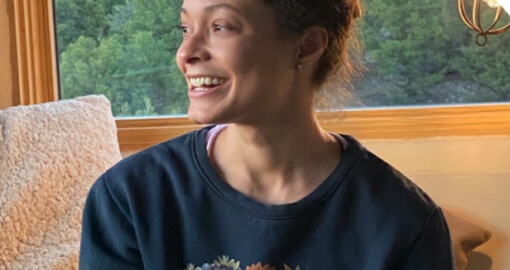Written by Shannon,
Brightside Health
12 Minute Read

Medically reviewed by:
Erin O'Callaghan, PHD
Director of Therapy
10 Minute Read

A little anxiety is often a part of life from time to time. However, when it begins to interfere with daily activities, knowing how to deal with anxiety becomes essential.
If you’re wondering how to calm anxiety, there are various techniques and strategies that can effectively manage anxiety symptoms, ranging from lifestyle changes to professional support.
Implementing regular exercise, practicing relaxation techniques, and maintaining a healthy lifestyle can significantly help in managing and living with anxiety.
This article will focus on practical strategies and expert recommendations to help manage anxiety effectively. If you’re looking at how to fix anxiety or alleviate your symptoms, read on.
Common Symptoms of Anxiety Disorder
Anxiety disorders can manifest through various symptoms, and these often vary from person to person. From generalized anxiety disorder to social anxiety, understanding these symptoms is crucial for diagnosis and treatment.
Can anxiety cause chest pain? Yes, it can, along with other physical symptoms, including increased heart rate, sweating, trembling, and shortness of breath. Some individuals may also experience dizziness or nausea.
Mentally, someone suffering from anxiety might encounter persistent feelings of worry or fear, have trouble concentrating, or experience a sense of impending danger.
Behavioral signs can involve avoidance of activities, situations, or places that trigger anxiety. Emotional manifestations, such as irritability or restlessness, are also frequently observed. Sleep disturbances are also common, including difficulty falling asleep or staying asleep.
If left untreated, these symptoms can lead to debilitating anxiety, reducing one’s ability to function daily. Recognizing the signs of anxiety can aid in seeking timely support and intervention to understand how to reduce anxiety.
How to Manage Anxiety and Stress? The 5 Most Effective Strategies to Cope With Anxiety
If you’re trying to figure out how to manage both the symptoms and root causes of social anxiety, there are a variety of treatment options and therapeutic approaches that can help.
Below are several proven methods for coping with social anxiety:
1. Psychotherapy
One of the most effective ways to treat anxiety disorder is through cognitive behavioral therapy (CBT). This form of therapy helps individuals recognize and reshape unhelpful thought patterns that often trigger anxiety in social environments.
CBT sessions are structured and goal-oriented, guiding individuals to replace irrational fears with more grounded, realistic thinking. A core part of CBT also includes behavioral techniques like gradually facing social fears in a controlled, supportive setting.
Over time and with consistent practice, CBT can lead to a notable reduction in anxiety symptoms and increased confidence in social situations.
2. Medications
Medication can be a helpful tool in managing anxiety disorder, especially when symptoms are severe or interfere with daily life.
Selective serotonin reuptake inhibitors (SSRIs) such as sertraline (Zoloft) and fluoxetine (Prozac) are commonly prescribed and often serve as the first step in medication-based treatment. These work by enhancing serotonin levels in the brain to stabilize mood and ease anxiety.
In certain cases, short-acting medications like benzodiazepines (e.g., alprazolam or clonazepam) may be used to quickly reduce intense anxiety symptoms. However, these carry a risk of dependence and are generally prescribed for limited, short-term use.
Beta-blockers, like propranolol, may also be helpful for specific social situations—such as public speaking—by reducing physical symptoms like shaking or a racing heartbeat.
Since individuals respond differently to medications, it’s important to work with a healthcare professional to find the most effective and safe option.
3. Support Groups
Being part of a support group can offer significant emotional relief and validation for those navigating anxiety.
These groups create a safe, empathetic space where people can talk about their experiences, exchange practical advice, and feel less alone in their struggles.
Participating in group discussions can help reduce the fear around social interactions and give members a chance to practice conversational skills in a judgment-free environment.
Support groups can be found both online and in-person, offering flexible access to community support. For many, this kind of peer interaction serves as a powerful supplement to therapy or medication.
4. Self-Help Strategies
Incorporating self-care and personal coping strategies can greatly enhance professional treatments for anxiety.
Practices like meditation, deep breathing, and mindfulness exercises can help calm racing thoughts and keep individuals grounded in the moment.
Physical relaxation methods, including progressive muscle relaxation, can also ease tension and reduce the body’s anxiety response during social encounters.
Gradual exposure—taking small steps to face feared situations—has been shown to build long-term resilience and reduce avoidance behavior.
Keeping a journal to track progress, identify anxiety triggers, and reflect on experiences can be a helpful self-awareness tool. On top of that, maintaining healthy routines like regular exercise, balanced meals, and quality sleep can support overall emotional health and reduce anxiety levels.
5. Combination Treatments
Often, the most effective approach to anxiety involves a combination of therapy, medication, and self-help practices.
By addressing the condition from several angles, individuals can create a more customized and well-rounded plan that targets both symptoms and root causes.
For example, medication might help ease severe anxiety enough to allow someone to fully engage in CBT sessions. At the same time, incorporating self-help habits and support groups can reinforce what’s learned in therapy and offer continued encouragement.
Since everyone’s experience with anxiety is different, building a treatment plan tailored to individual needs is key to long-term success. For additional guidance, you may find these resources on coping with anxiety useful as well.
Want to speak 1:1 with an expert about your anxiety & depression?
What Not to Do When Dealing With Anxiety
Knowing what helps anxiety, such as healthy coping techniques, is important. However, it’s also necessary to understand what can make your anxiety worse.
If you suffer from anxiety, it’s essential to avoid alcohol and recreational drugs. These substances can exacerbate anxiety levels and reduce the effectiveness of any other coping mechanisms for anxiety being implemented. Substances like THC can introduce additional complications to mental health.
You should also steer clear of excessive caffeine intake if you’re trying to manage your anxiety. Caffeine can increase feelings of jitteriness and tension. Reducing or eliminating caffeine can help manage symptoms more effectively.
We should avoid spending too much time on screens when trying to reduce stress levels, especially before sleep. The light from screens can interfere with sleep patterns, crucial for maintaining mental balance.
Remember that if you’re learning how to ease anxiety, trying to change too much at once can be overwhelming and may further contribute to high stress levels. It’s important to set realistic goals and tackle them in small, manageable steps.
Avoid focusing on things that can’t be changed. Otherwise, this behavior will often lead to feelings of helplessness and can increase anxiety levels. Instead, concentrate on aspects you have control over.
Know When to Ask for Anxiety Help
Anxiety can be a normal part of life, but there are moments when seeking professional help becomes necessary. Knowing how to handle anxiety effectively means knowing when to ask for help.
Want to speak 1:1 with an expert about your anxiety & depression?
Signs That You Might Need Professional Help for Your Anxiety
- If anxiety starts to interfere with daily activities like work, school, or social interactions, it’s a sign to seek help.
- Ongoing feelings of panic or danger, especially if frequent, can also be indicators that professional help is needed.
- If you’re experiencing long-term physical symptoms, such as having trouble sleeping or the inability to stay calm, it may be necessary to see a physician.
- Physical symptoms like cold sweats or tingling sensations shouldn’t be ignored.
- If you suffer from anxiety attacks, deep, calming breathing exercises can sometimes alleviate anxiety. However, professional guidance is advisable when these attacks become recurrent and unmanageable and your usual coping strategies for anxiety aren’t working.
Professional Help
If self-care strategies aren’t effective, or anxiety seems overwhelming, a healthcare professional’s advice can make a huge difference. Mental health professionals, including therapists or counselors, can offer structured support for overcoming anxiety.
Recognizing these signs of anxiety and responding promptly enhances the possibility of effective management and recovery.
Need Professional Help to Deal With Your Anxiety?
Struggling with anxiety can feel overwhelming, but you don’t have to face it alone.
Brightside Health offers expert, evidence-based treatment designed to help you regain control and find relief. With personalized therapy and medication plans, you can start feeling better from the comfort of your home.
Take the first step toward a brighter future—get started with Brightside Health today and take our free online anxiety test.
Want to speak 1:1 with an expert about your anxiety & depression?
How to Deal With Anxiety: Key Takeaways
Managing anxiety requires a combination of lifestyle adjustments, mindfulness practices, and self-awareness. Learning how to control anxiety can significantly improve your quality of life.
Regular exercise, a balanced diet, and avoiding substances like alcohol help support mental well-being.
Mindfulness techniques, such as meditation and deep breathing, can aid in staying present and reducing stress. Identifying and addressing personal triggers is key to long-term anxiety management.
The most important takeaway is that a sustainable approach combining these strategies leads to better overall mental health.
FAQs
What is the 3-3-3 rule for anxiety?
If you’re wondering how to deal with anxiety attacks, the 3-3-3 rule is a simple technique to help ground your thoughts during an anxiety episode.
It involves focusing on one’s surroundings by naming three things you can see, three sounds you can hear, and by moving three parts of your body.
This method helps shift the focus away from anxious thoughts and brings attention to the present moment. Practicing this can be a quick way to interrupt the cycle of anxiety, making it easier to regain a sense of calm.
What are the 4 C’s of anxiety?
If you suffer from anxiety, you’ll probably want to know how to lower your anxiety levels. The 4 C’s of anxiety refer to techniques that are some of the ways to cope with anxiety: calm, clarity, choice, and courage.
Calm involves slowing down and regulating breathing. Clarity means understanding the root cause of the anxiety. Choice is about finding constructive responses to anxiety triggers, and Courage is facing fears rather than avoiding them.
Together, these approaches can help individuals better manage anxiety symptoms.
What to drink when anxious?
Certain beverages can have calming effects if you’re feeling anxious. Herbal teas such as chamomile or lavender are popular options known for their soothing properties. Green tea, which contains L-theanine, may promote relaxation.
Staying hydrated by drinking water is also crucial, as dehydration can exacerbate feelings of anxiety.
Avoiding caffeine and alcohol can help, as these can increase anxiety symptoms.
What foods reduce anxiety?
Incorporating specific foods into one’s diet can help reduce anxiety.
Fatty fish, like salmon and mackerel, provide omega-3 fatty acids essential for brain health. Dark chocolate contains flavonoids that might boost mood. Foods high in magnesium, such as leafy greens and nuts, as well as probiotic-rich foods like yogurt, can support mental health.
Maintaining a balanced diet can be an effective way to manage anxiety.
What is the number 1 way to relieve anxiety?
Exercise is often considered one of the most effective ways to relieve anxiety.
Physical activity releases endorphins, natural mood lifters, and can significantly lower stress and anxiety levels.
Consistent exercise routines, such as walking, jogging, or yoga, contribute to improved mental health. Finding an enjoyable activity is key, as it increases adherence and results in more consistent anxiety relief.
Does water help with anxiety?
Staying well-hydrated is crucial for overall health and can influence anxiety levels.
Dehydration can manifest as increased heart rate and tension, potentially mimicking anxiety symptoms. Drinking sufficient water helps maintain optimal body function, which can reduce these physiological triggers.
Aiming for the recommended daily intake of water can be a simple step towards better managing anxiety.
How to stop anxious thoughts in 30 seconds?
An effective way to stop anxious thoughts quickly is by using distraction techniques.
Simple activities like reciting a poem, counting backward, or engaging in a quick puzzle can divert attention from anxiety-provoking thoughts.
These tasks require focus and can interrupt negative thought patterns, helping you to regain control and calmness rapidly.
Where to massage to relieve anxiety?
Some massage points can help alleviate anxiety symptoms. Acupressure points, such as the area between the eyebrows (third eye point), behind the ears, and inside the wrist, are often targeted.
Applying gentle, circular pressure on these points may promote relaxation and reduce stress. Regular massage therapy sessions can also aid in reducing anxiety levels over time.
What is the hand trick for anxiety?
The hand trick, or the 5-4-3-2-1 grounding exercise, utilizes the senses to help manage anxiety.
Look for five things you can see, identify four you can touch, listen for three you can hear, recognize two you can smell, and perceive one you can taste.
This method grounds one in the present moment and can decrease the intensity of anxious feelings.
What is diaphragmatic breathing?
Diaphragmatic breathing, or deep breathing, involves actively engaging the diaphragm during inhalation. This technique increases oxygen intake and encourages relaxation.
Practicing slow, deep breaths by inhaling through the nose, expanding the abdomen, and exhaling through the mouth can help reduce physical symptoms of anxiety.
This breathing method is an accessible tool for managing stress and promoting relaxation.
Is tapping good for anxiety?
Tapping, or emotional freedom techniques (EFT), involves tapping on specific acupressure points while focusing on anxiety. It’s believed to help balance energy and reduce stress levels.
By combining physical tapping with mindful acknowledgment of the anxiety, many find a reduction in the intensity of their symptoms.
While research is ongoing, some people experience significant relief through this approach.




















